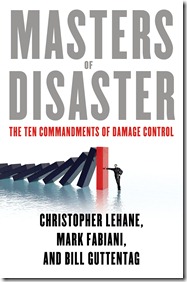The Ten Commandments Of Damage Control
Editor’s Note: This is an excerpt from “Masters of Disaster,” an excellent new book about crisis communications. The book goes into much greater detail about each of the ten “commandments” mentioned below.
I. Full Disclosure
Everything that can come out, will come out. All too often it’s the drip, drip, drip that causes most of the lasting damage. But you only get one bite at the apology apple.
II. Speak to Your Core Audience
Determine the key points to get across and stay focused on them. Reiterate your message at every opportunity. Discipline is crucial. But do not pander.
III. Don’t Feed the Fire
It’s human nature to succumb to the pressures of the moment that push you into making the situation worse. Resist that pull. But the prevent defense can keep you from winning.
IV. Details Matter
Be prepared with detailed answers to tough questions. The smallest discrepancy can get magnified into the biggest problem. But you are not in a confessional.
V. Hold Your Head High
Original actions may seem insignificant compared with mistakes made after the fact. Seize the moment to put out the entire story. But there are no second acts.
VI. Be Straight about What You Know, What You Don’t Know, and What You Are Going to Do to Fix the Problem
Your credibility is at stake—and the public can easily discern hedged answers and half-truths. When you don’t have answers, create a process to ascertain the answers, and make clear how you will fix the problem going forward. But don’t pick a fight you can’t win.
VII. Respond With Overwhelming Force
Identify the most important groups you’re trying to reach and what it is they need to hear. Keep it simple and keep saying it. But no message handcuffs.
VIII. First In, First Out
You can reduce your exposure by getting your story out there quickly and candidly. Often there are multiple players in a crisis, so let others become the star of the scandal. But know when to hold ’em, know when to fold ’em, and know when to run.
IX. No Swiftboating
Your setback is your rivals’ opportunity—and that setback often comes from those with unclean hands. Get on top of your story and your message before they do, because they’ll try to make you look worse. Expose the real agenda of your opposition. But no civilian casualties.
X. They Dissemble, You Destroy
If your opponents engage in misrepresentations about you, your organization, or your company, go after them—hard. You protect your reputation—and undermine theirs. But don’t be too quick to judge and too soon to accuse. Damage control is not horseshoes or hand grenades, close does not count. You must have the opposition dead to rights if you call them out.
Want to read more? Masters of Disaster is available in hardcover here and for the Kindle here.
Copyright © Christopher Lehane, Mark Fabiani, and Bill Guttentag, 2012.




This was very helpful. Thank you.